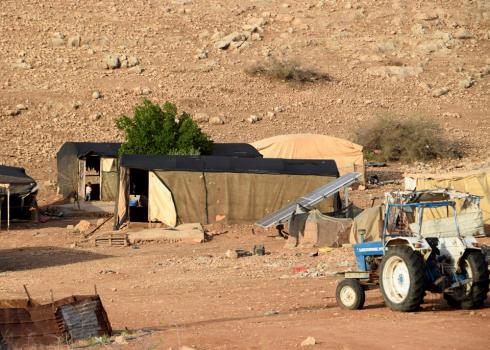Ongoing: Palestinians in West Bank forcibly transferred under cover of Gaza war (29 communities as of 31 May '25)
Facing Expulsion
Thousands of people – residents of dozens of Palestinian communities located throughout Area C, the West Bank – face imminent expulsion by Israeli authorities on a variety of pretexts. The live blog will pool the regular updates we get from B’Tselem field researchers regarding the communities and any attempts by authorities to expel them. Click on the number of a community cluster and then on the tent icon marked on the map for further information about communities facing the risk of expulsion.
The information in the blog reflects the latest state affairs known to us and is updated as we receive new data from the field. For more on the communities facing expulsion, click here.
Israel demolished most of the homes in the community of Khirbet Khallet a-Dabe’ in Masafer Yatta, the South Hebron Hills, leaving 49 people, including 27 minors, homeless
On Monday, 5 May 2025, in the morning hours, Civil Administration personnel, escorted by Border Police officers and soldiers and equipped with an excavator and bulldozer, arrived in the community of Khirbet Khallet a-Dabe’ in the South Hebron Hills. The forces demolished ten homes, leaving 49 people, including 27 minors, without shelter. Additionally, the forces demolished 11 sanitation structures, two kitchen structures, 11 water tanks, five water cisterns, three structures used as sheep pens (including a cave), a hospitality hall, an electricity room, a solar power network and water infrastructure.
The community was left with the school building and four residential homes that are still under legal proceedings. Families whose homes were demolished received tents from a humanitarian organization and remained in the community area.
Khirbet Khallet a-Dabe’ is one of the communities in the Masafer Yatta region of the South Hebron Hills, which Israel declared a “closed military zone” in the early 1980s, with the aim of seizing the area and expelling its residents. Since then, the state has prohibited the development of the communities—many of which predate the occupation of the West Bank—prevented their connection to water and electricity infrastructure, and repeatedly demolished their homes, any infrastructure they tried to build, and even the roads leading to the communities. In recent years, the communities have also suffered repeated settler attacks, often with army assistance, which also allows settlers to establish outposts within the declared “firing zone” adjacent to them.
Israel demolishes Palestinian homes and agricultural structures, leaving families homeless in the Jordan Valley
On Monday, 5 May 2025, Civil Administration personnel, accompanied by soldiers and two bulldozers, arrived in Khirbet a-Deir in the Jordan Valley. They demolished two homes, leaving two families—five people, including one minor—without shelter.
The forces also destroyed two shacks used as sheep pens, five fodder storage tents, and two outhouses. They vandalized eight water tanks, 28 solar panels, and ten feeding troughs.
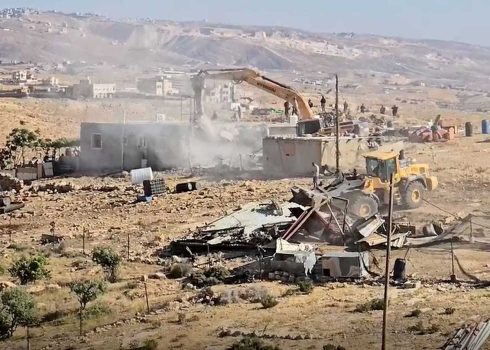
Israel demolishes two homes and other structures, leaving 22 Palestinians homeless
On Tuesday, 29 April 2025, Civil Administration forces, accompanied soldiers and Border Police and equipped with four bulldozers, arrived atin the village of a-Zuweidin in the South Hebron Hills. The force demolished two homes, leaving left two families – 22 people, including 17 minors – homeless. The force also demolished two water cisterns, a shack used as a sheep pen, and three livestock enclosures.
Israel demolishes water cistern and vandalizes water tanks, South Hebron Hills
On Tuesday, 22 April 2025, Civil Administration personnel, accompanied by soldiers and Border Police officers and equipped with a bulldozer, arrived in the community of al-Jawaya, southeast of the town of Yatta in the South Hebron Hills. They demolished a water cistern and vandalized a water tank.
Civil Administration demolishes irrigation pool and confiscates solar panels and generators
On Wednesday, 9 April 2025, at around 10:00 A.M., Civil Administration personnel, escorted by soldiers and equipped with a bulldozer, arrived at the community of Khirbet a-Deir in the Jordan Valley. The forces demolished an irrigation pool and confiscated three solar panels and two generators.
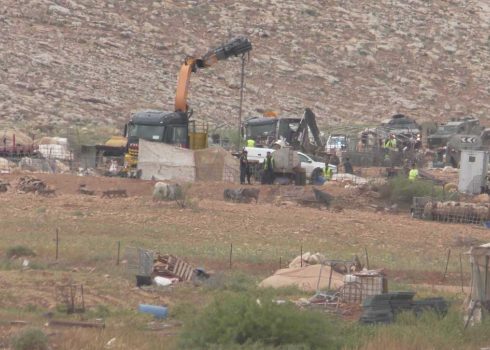
Civil Administration dismantles and confiscates homes of 4 families, leaving 35 people, 15 of them minors, without shelter
On Sunday, 6 April 2025, at around 9:00 A.M., Civil Administration personnel arrived with a bulldozer and trucks, escorted by soldiers and members of the Jordan Valley Settlement Council, to the area of Ras al-Ahmar in the Jordan Valley. The forces dismantled and confiscated eight residential tents, leaving four families – a total of 35 people, 15 of them minors – without shelter. The families had relocated to the area after settler violence drove them out of their homes in Khirbet Samrah about 20 days earlier. The forces also demolished a livestock enclosure and confiscated eight livestock pens, three water tanks, two generators, two solar panels, and two carts used for carrying goods.
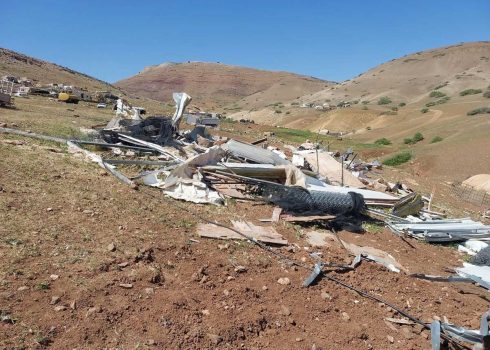
Israel demolished a family's home for the second time in a month, along with additional structures in the Jordan Valley
On Monday, 31 March 2025, at around 8:00 A.M., Civil Administration personnel arrived in the village of Bardalah with a military escort and a digger. The forces demolished a tin-roofed chicken coop under construction. They then proceeded south to the community of al-Farisiyah (Khallet Khader), where they demolished an unoccupied house, an agricultural tent, a sheep pen, and two water tanks, and damaged an irrigation pipe.
From there, the forces continued west to the al-Burj area, where, for the second time in a month, they demolished a family’s shack, home to eight people, including four minors, as well as the family’s sheep pen and outhouse. The family’s home was previously demolished on 25 November 2024.
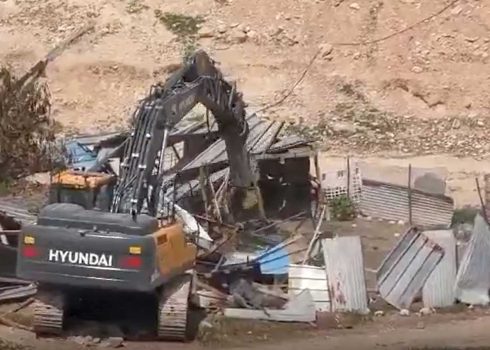
Israel demolished agricultural structures, water tanks, and 18 solar panels
On Friday, 18 March 2025, Civil Administration personnel, arrived at the Bedouin community of al-Mu’arrajat East (Mleiḥat) in the Jordan Valley escorted by soldiers and members of the Jordan Valley Settlement Council and equipped with a digger. The Israeli forces demolished two shacks used as sheep pens, a livestock enclosure, two troughs, two water tanks, and 18 solar panels.
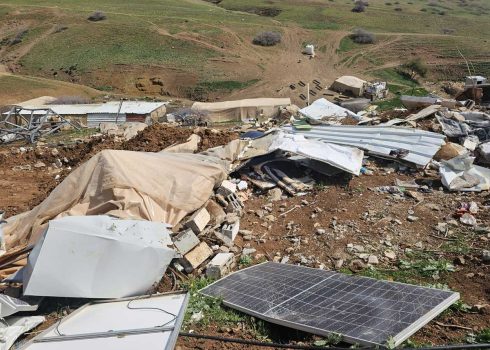
Israel demolished two homes, a livestock enclosure, solar panels and water tanks in the Jordan Valley
On Thursday, 6 March 2025, at around 9:00 A.M., Civil Administration personnel, accompanied by soldiers and equipped with an excavator, arrived at the community of al-Burj in the northern Jordan Valley. The forces demolished two tents that housed a family of eight, including four minors, as well as a tent used as a kitchen and bathroom, solar panels, and two water tanks belonging to the same family. The residential tents had been erected after the Civil Administration demolished the family’s home on 25 November 2024.
From there, the forces continued to Khirbet Um al-Jamal, where they demolished a residential shack and a livestock enclosure that had been left empty after most of the community’s residents were expelled from their homes under settler threats on 12 August 2024.
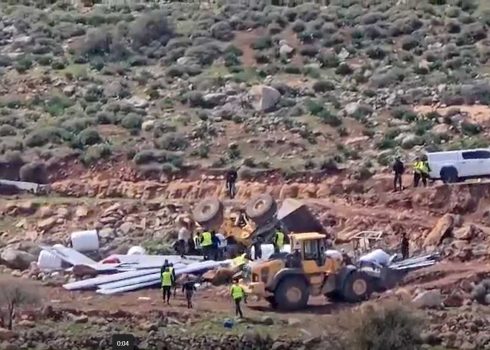
Israel demolished and confiscated five homes, water tanks and additional structures, sealed caves used as livestock enclosures, destroyed a road, and damaged the power grid
On Thursday, 6 March 2025, Civil Administration personnel, accompanied by Border Police officers and equipped with an excavator, arrived at the community of Khirbet a-Twayel in Nablus District. The forces demolished five homes, leaving five families—25 people, including 12 minors—homeless.
The forces also demolished a fence and three shacks used as livestock enclosures, and dismantled and confiscated another shack used as a livestock enclosure and an outhouse. They demolished or confiscated 10 water tanks, sealed two caves used as livestock pens and for storage, destroyed a road, and damaged the community’s power grid.
The structures were erected after the Civil Administration previously demolished the families' homes and livestock enclosures, some on 10 December 2024 and others on 8 January 2025.
Israel demolishes five homes, leaving eight people homeless
On Tuesday, 18 February 2025, at around 8:00 A.M., Civil Administration personnel, accompanied by soldiers and Border Police officers and equipped with two excavators, arrived at the community of Um al-Kheir in the South Hebron Hills. The forces demolished three homes, leaving three young men homeless. The forces then continued to the community of a-Rakeez in Masafer Yatta, where they demolished a trailer home, leaving a family of five, including three minors, homeless. After that, the forces proceeded to She’b al-Batem, also in Masafer Yatta, where they demolished a trailer home that was not yet inhabited and a livestock enclosure.
Israel demolishes homes in Masafer Yatta, leaving 9 families homeless
On Monday, 10 February 2025, at around 9:00 A.M., Civil Administration personnel came with a military escort and three excavators to the community of Khirbet Khallet a-Dabe’ in the Masafer Yatta area in South Hebron Hills. The forces demolished seven cinder-block structures with tin roofs that were home to seven families, leaving 54 people, including 28 minors, homeless. They also destroyed four caves, two water cisterns, two water tanks, three solar panels and a stone fence used by some of the families.
The forces then continued north to the community of Maghayir al-‘Abid, where they demolished an agricultural structure. From there, they moved south to the community of Khirbet Jinbeh, where they demolished two more cinder-block structures with tin roofs that were home to two families, leaving 20 people, including seven minors, homeless.
Israel’s regime of apartheid and occupation is inextricably bound up in human rights violations. B’Tselem strives to end this regime, as that is the only way forward to a future in which human rights, democracy, liberty and equality are ensured to all people, both Palestinian and Israeli, living between the Jordan River and the Mediterranean Sea.
